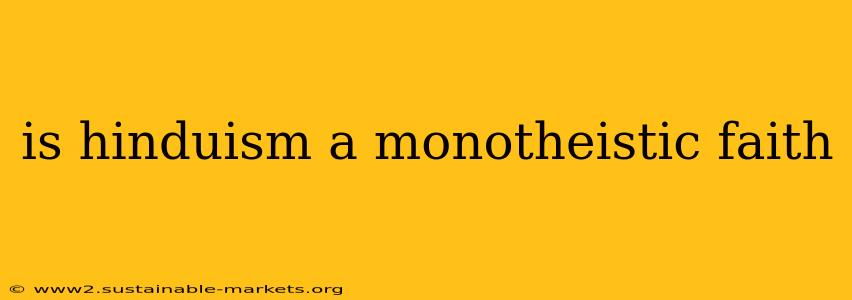The question of whether Hinduism is monotheistic, polytheistic, or something else entirely is a complex one, defying simple categorization. While often perceived as polytheistic due to its vast pantheon of gods and goddesses, a deeper understanding reveals a more nuanced perspective on the nature of divinity within the Hindu faith. The answer, therefore, is not a straightforward yes or no.
The Diverse Landscape of Hindu Beliefs
Hinduism's rich tapestry of beliefs encompasses a multitude of perspectives on the divine. The vast array of deities, each with their own stories, attributes, and domains, can understandably lead to the perception of polytheism. We see gods like Brahma the creator, Vishnu the preserver, and Shiva the destroyer, along with countless other figures representing different aspects of the cosmos and human experience. However, this apparent multiplicity often masks a deeper understanding of the divine.
The Concept of Brahman
At the heart of Hindu philosophy lies the concept of Brahman, the ultimate reality, the absolute, and the source of all existence. Brahman is not a personal god in the same way as the individual deities; it is the underlying, all-encompassing consciousness from which everything emanates. This concept is central to many Hindu schools of thought, particularly Vedanta. The many gods and goddesses are often viewed as manifestations or aspects (avataras) of Brahman, expressions of its infinite nature.
Monism and Non-Dualism (Advaita Vedanta)
Several schools of Hindu philosophy, most notably Advaita Vedanta, emphasize non-dualism (Advaita), the idea that the individual self (Atman) is ultimately identical with Brahman. This perspective suggests that the apparent multiplicity of the world, including the gods, is an illusion (Maya). True reality is the singular, indivisible Brahman. This aligns more with a monistic view than a polytheistic one, although it's crucial to note that this is just one interpretation within the vast Hindu tradition.
Beyond Monotheism and Polytheism
The traditional labels of "monotheism" and "polytheism" may not adequately capture the complexity of Hindu beliefs about divinity. While acknowledging the multitude of deities, many Hindus see them as different facets of a single, ultimate reality. The devotional practices (bhakti yoga) directed towards individual gods can be viewed as pathways to realizing the ultimate truth of Brahman.
Conclusion: A Multifaceted Understanding
Ultimately, labeling Hinduism as strictly monotheistic or polytheistic is an oversimplification. Its understanding of the divine is far more nuanced and multifaceted, incorporating elements of both. The diverse schools of thought within Hinduism offer varied perspectives on the nature of reality and the relationship between the individual, the deities, and Brahman. A richer understanding requires appreciating this diversity and the underlying unity that many Hindus believe connects all aspects of the divine. Instead of forcing Hinduism into pre-existing categories, it's crucial to approach its spiritual landscape with respect for its intricate complexity.

